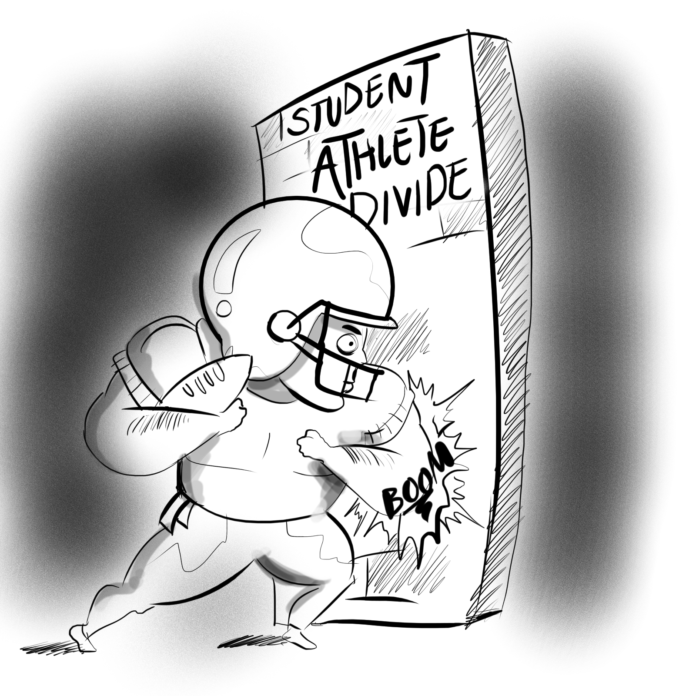Student-athletes aren’t your everyday students; they don’t keep traditional schedules and they certainly aren’t held to the same standards as the rest of the student body. They often have more on their plates, both metaphorically and physically, and unlike most students, their extracurricular activities tend to dictate the rest of their daily lives. No, student-athletes are far from normal, but the divide between athletes and traditional students at Baylor seems to be continually growing, perpetuated by privileges and rules that apply only to student-athletes, effectively isolating them from the rest of the student body. While this may be commonplace among collegiate athletes, there is a thin line between helping student-athletes succeed and separating them from the student body, and Baylor should be careful not to cross it.
We all watched throughout the summer as Baylor came under fire not only for its apparent mishandling of sexual assault cases, but also for its insulation of student-athletes against disciplinary action for misconduct. Pepper Hamilton, the independent law firm hired to investigate Baylor’s Title IX practices and disputed cases, conducted an investigation that revealed “significant concerns about the tone and culture within Baylor’s football program as it relates to accountability for all forms of athlete misconduct” and raised the question of whether Baylor’s athletic department was fostering a cultural perception of athletes being above the rules, according to the Baylor University Board of Regents “Findings of Fact.”
While the university has made progress implementing Pepper Hamilton’s 105 recommendations, it seems to still be placing athletes in an entirely separate category from traditional students in a time when it is especially important to remember that athletes are only be a subset of, not separate from or better than, the larger student population.
In a recent rule change, student-athletes who test positive on drug tests administered by the NCAA, the Big 12 Conference or Baylor’s athletic department will no longer be subject to university discipline. All disciplinary actions will now be handled internally, and student-athletes will not face Baylor’s standard punishments for students caught using illegal drugs.
According to the Baylor Athletics Substance Abuse Testing Policy, “The university will not pursue disciplinary charges by the Office of Student Conduct Administration (Judicial Affairs) in situations in which either illegal or performance-enhancing drugs are discovered through drug testing…”
Baylor’s general policy forbids the use, purchase, manufacture or selling of any illegal drugs, and “anyone violating these policies is subject to disciplinary action ranging from warning to expulsion,” according to Baylor’s Policy Statement on Alcohol and Other Drugs.
Instead of facing these consequences in addition to their athletic consequences, as has been the case previously, all disciplinary action for student-athletes will now be handled internally, and they will not face Baylor’s standard punishments for students caught using illegal drugs.
Translation: Athletes will be subject to athletic discipline and exempt from university discipline.
Perhaps the consequences of student-athletes testing positive for illegal drugs will be handled at the NCAA or conference level. We can only hope that this will be kept out of Baylor’s hands as much as possible, because isn’t internalizing the handling of misconduct cases one of the reasons Baylor was in such hot water over the summer?
The Board of Regents’ “Finding of Fact” from the Pepper Hamilton report states, “Athletics personnel failed to recognize the conflict of interest in roles and risk to campus safety by insulating athletes from student conduct processes.”
Does this not also represent a conflict of interest? Yes, student-athletes who test positive for illegal drugs will still face consequences such as being suspended from play or even permanently removed from their team in the case of severe or repeated violations, but it seems as though this policy change gives Baylor’s athletics department too much room to “insulate” their athletes, despite the fact that Baylor spent the whole summer reeling from the effects of the same.
Baylor needs to be careful how closely it toes the line between helping student-athletes succeed in school and athletics and putting those athletes on a pedestal, above and separate from the rest of the student body. Student-athletes lead a different lifestyle than other students, but Baylor should remember that only a small percentage if its student-athletes will play their sport professionally post-graduation, and insulating student-athletes during their college years isn’t doing them any favors.






